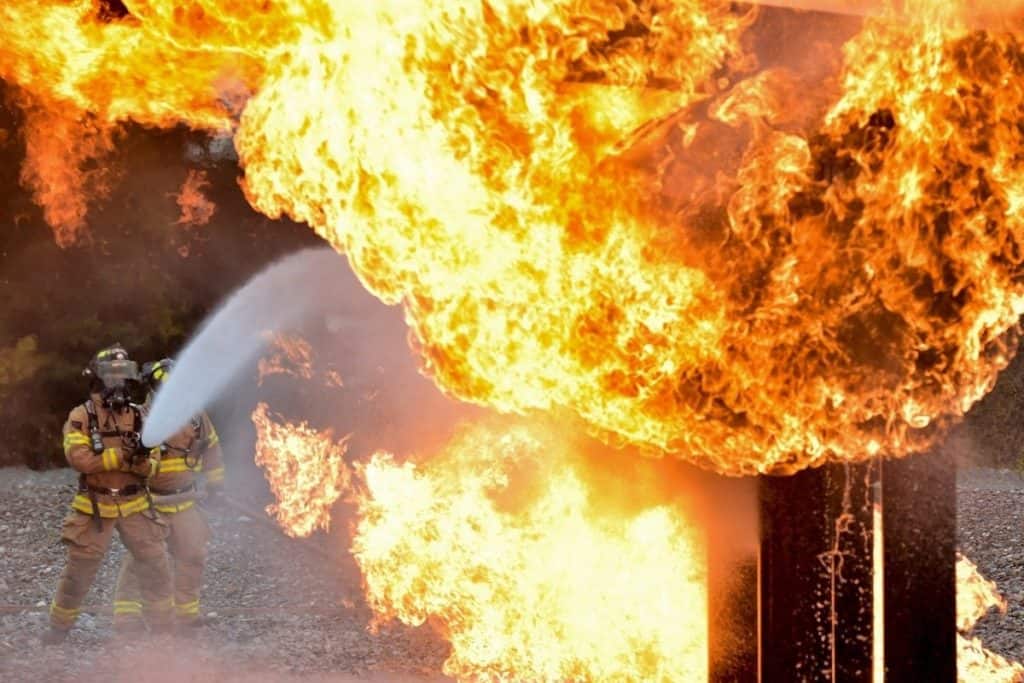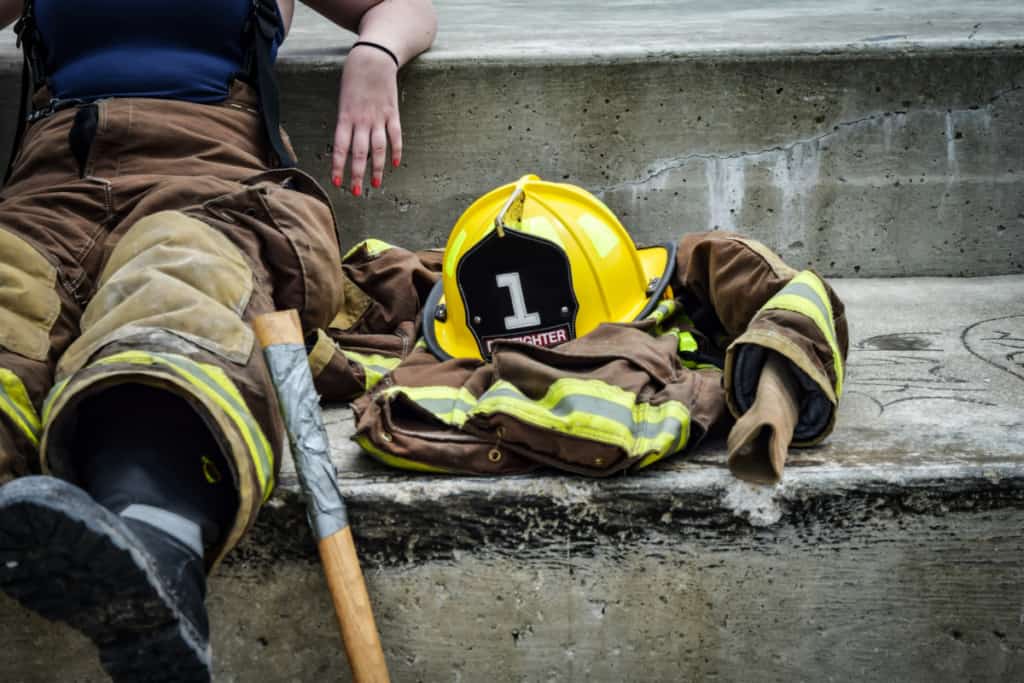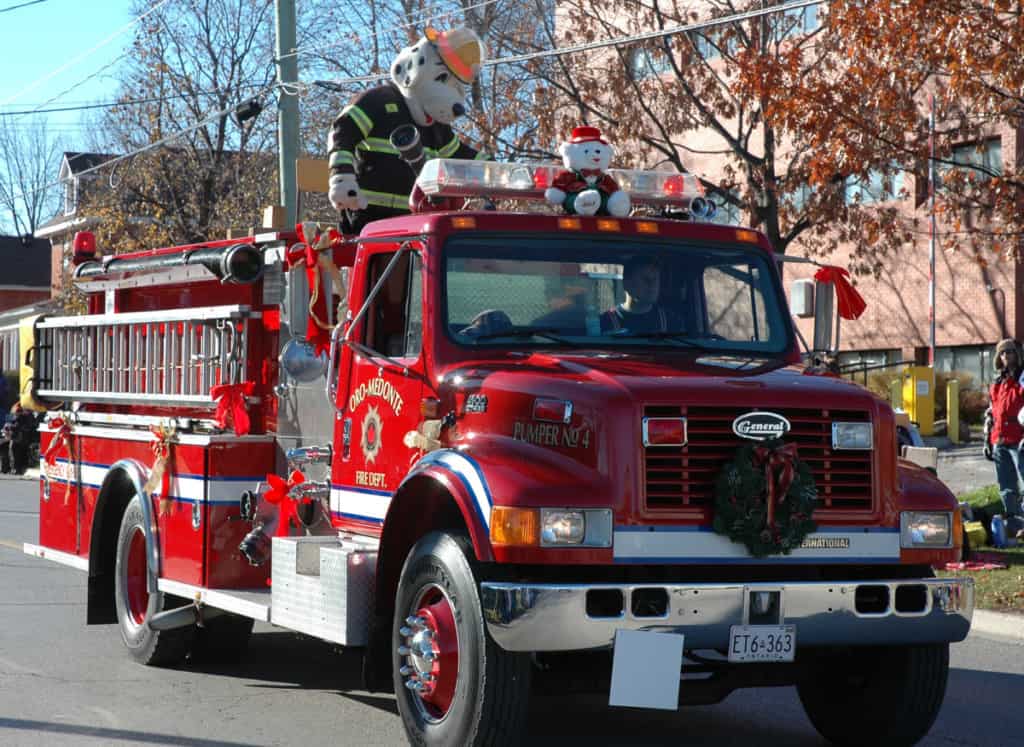If you’re thinking about taking up firefighting as a profession, then you’re probably wondering how long it will take for you to pick up your first paycheck as a professional firefighter. Well, the answer is “it depends” and there are some good reasons for that.
On average, it will take most people between 3 to 5 years to become a professional, paid, career firefighter. However, this timeline can really vary. The process to become a volunteer firefighter is usually much shorter.
I know this isn’t a very specific answer, but there are a lot of factors that will affect the time it takes for you to become a firefighter. Some people may take less time and for others, it could take much longer. Read more below to get a better understanding of the actual time you can expect it to take you.
Your # 1 priority is keeping your family safe. As a firefighter, I recommend everyone has updated smoke detectors that don’t require battery changes, like these ones from Kidde, a fire extinguisher, like this one from Amerex, and a fire escape ladder if you have bedrooms above the first floor, I recommend this one from Hausse.
Also read: How to Become a Firefighter: The Complete Guide
Timeline to Get Hired: Why Does it Vary So Much?
Most aspiring firefighters are surprised when they hear how long this process can take.
If that sounds crazy, it isn’t. There isn’t a single American fire service and thus each department around the country has different hiring and training criteria.
You can join some fire departments with just a high school diploma and others require other specialist qualifications on top (which require additional work to obtain).
But the variation in minimum hiring requirements is not the main reason it can take so long to get into this career… The main reason is competition.
Even when the department requirements are low, due to the amount of competition, it can still take a long time to get hired.
Then, of course, as we’ve just said, it depends on how we define “firefighter”. Do we mean someone who has a job in a fire department, do we mean someone who is competent to fight fires, or do we mean someone who is truly expert in all areas of the fire service?
Here is a Fire Captain from Ventura, California talking about how long it took for him to get hired:
So, with that in mind, let’s take a look at the different potential steps on the path to becoming a firefighter and how long each of them might take you to achieve.
How Long Does it Take to Become a Firefighter?
So, let’s just take a look at some of the steps to becoming a firefighter and then we can see how long each may take.
| Activity | Time Taken |
| EMT School | 6 months |
| Paramedic Training | 1 – 2 years |
| Fire Science Education | 2 – 4 years |
| Application + Hiring Process | 2 months – 5+ years |
| Fire Academy | 3 – 6 months |
| Probationary Period | 6 months – 2 years |
| Ongoing Learning | Entire Career |
Assuming that we took the outside numbers for the hiring process, training, probationary, fire science and paramedic training, then we’d be looking at a period of up to 14 years! That’s a pretty impressive amount of time. But if we look at the minimum times, it’s more like 5 years.
However, not everyone will need to complete every one of these steps to become a firefighter and each step can take different amounts of time. This will depend on where you are applying.
The other thing to remember is that some of these steps can be worked on at the same time. You can be in EMT school and working on Fire Science classes at the same time.
Also read:
- Can You Become a Firefighter with No Experience? Here’s How
- Career Change to Firefighter: What You Need to Know
- How Long Does It Take to Become an EMT?
- How Long Does It Take To Become a Paramedic?
Let’s look more into all these firefighter training steps below.
7 Steps to Becoming a Firefighter
While technically speaking, you can get a firefighter job with just a GED/High school diploma, in reality, there are many other things that you can obtain on top that will seriously improve your chances of getting a job in a fire department. Many places will even require these in order to apply.
Remember that not everyone has to complete all these steps or in this order to become a career firefighter, but these are the basics that many of the candidates you will be competing against for a job will have completed.
1. EMT/Paramedic Training

Most fire departments will expect you to have an EMT basic certification (Emergency Medical Technician) in order to apply. So EMT training is a good first step.
Many fire departments run significantly more medical calls than fires. That is why they need firefighters to get their EMT certification; to be prepared for the emergency medical side of the profession.
If you really want to boost your chances of getting a job as a firefighter then you might want to consider becoming a licensed paramedic. A Paramedic certification can really improve your odds of getting the job.
Of course, this can add at least another year of training, but it will open up more job opportunities for you. There are some fire departments that will only hire paramedics.
Also read:
- Do Firefighters Have to Be Paramedics or EMTs?
- What is a Firefighter Paramedic
- Why Do Firefighters Go to Medical Calls?
- How to Become an EMT: Expert Guide
2. Fire Science Degree
While the fire service used to be very much a blue-collar job that didn’t require higher education, that is no longer the case. As the career has evolved and firefighters are expected to do more, they are also required to learn more. So, even if many fire departments don’t require a college degree, in order to be competitive and get hired, a higher level of education can be invaluable.
There’s no escaping the value of a college education not even in the fire service. The majority of firefighters will undertake some form of degree training in fire science. If you opt for an associate degree – you can be out of college in 2 years.
However, you should know that if you opt for a 4-year bachelor’s degree, it may be easier to get a promotion at a later date.
If neither of these options is for you, any fire science classes (even if you don’t complete a degree) you take will be an asset to you as a firefighter candidate.
Extra education can also be useful in helping you to pass the written exam that is part of the firefighter hiring process.
This video can help you decide if a college degree is a good idea for you as an aspiring firefighter:
3. Volunteer Experience
While getting a job as a professional firefighter can take a long time, becoming a volunteer firefighter usually won’t take as long. This can be a great thing to add to your resume.
Volunteer firefighters are trained and expected to perform most all the same skills and tasks as professional firefighters. This means your experience as a volunteer will prove to your future department that you have what it takes to be a firefighter.
You can also get experience volunteering your time for non-fire service related organizations and programs. Any volunteer time shows that you want to help others and are willing to donate your time to do so. This is always seen as a positive to hiring chiefs.
4. Application/Hiring Process
We’ve mentioned passing tests, background checks, etc. above but, of course, this process takes time.
On top of that, because of the demands of training firefighters – fire departments tend to hire in batches intermittently rather than on a single person basis.
That means as a prospective firefighter, you may well have to wait before your fire department even advertises a job (this could be anything from 4 months to 5 years).
But you shouldn’t wait, you should apply to fire departments all over to have more chances of getting hired. This will also help you improve at the testing process itself, so you are ready when your dream department is hiring.
Then on top of this, at a minimum, the application process and hiring process will take another 6-8 weeks minimum and sometimes up to a year or more. This includes the application, physical agility test, written test, interviews, background check, and medical exam.
That means you could spend anything from 2 months to 5 years, on average, just looking for a job in the fire service.
Also read:
- 7 Tips for Your Firefighter Application
- Firefighter Written Test: What to Expect and How to Prepare
- 8 Tips for the Firefighter Physical Test: Passing the CPAT
- 15 Tips for Firefighter Interviews
- Most Common Firefighter Interview Questions: Insider Info
- What to Wear to a Firefighter Interview: Attire for Getting Hired
5. Fire Academy
Once you join a fire department, you’re not done. Now you become a firefighter recruit.
You’ve only just begun your journey to learn to be a firefighter. You’re now looking at around 6 months of basic recruit training. That is where you’ll learn how things work, all of the basic firefighting skills you will need, and how to fit in with other firefighters.
Note: You can also put yourself through (you have to pay) a college Firefighter 1 Academy before you get hired. This can be a great way to learn the basics before you get a job so that you have seen all the material and skills before your job is on the line. The schedule and timeline may be different for these types of fire academies.
Also read:
6. Probationary Period
The next step in the process is to learn how to do your job and that means you’re going to spend about a year or two on probation where you work with other more experienced firefighters to learn the job and put your learning into practice. This also means learning about life around the fire station, to ensure you will be a good fit.
You will be supervised and tested frequently throughout the probationary period and it is your supervisor that will be responsible for deciding whether you then become a fully-fledged professional firefighter.
Also read: How Long is a Firefighter Probationary Period? and Reasons Why Firefighters Get Terminated During Probation
7. Continuing Development
Of course, even this doesn’t mean that you know everything that there is to know about firefighting. Learning and training are never-ending as a firefighter and it is a huge part of the job. From reviewing infrequently used skills, to reading new EMS protocols, to becoming familiar with updated equipment, to learning skills for promotion and change of position; there is always something to learn.
Some firefighters will spend time at the National Fire Academy learning additional skills that help broaden not just their firefighting knowledge but also their ability to work as part of bigger teams and to lead other firefighters.
A firefighter is also responsible for continuing professional development of their own. The objective is not to assume that once you’re getting paid and you’ve passed probationary that you’re a fully-fledged firefighter but rather to acknowledge that you can always be better informed and better trained.
Minimum Requirements to Become a Firefighter

If you want to become a firefighter then you must have a high school diploma. The job is quite intellectually demanding, and fire departments want to be certain that you can make the grade when it counts.
You also need to ensure that:
- You’re physically fit – you will be required to take a CPAT (Candidate Physical Ability Test) test which is fairly demanding
- You have a clean record – or, if you don’t have a clean record, you can demonstrate that you recognize your previous shortcomings and are working to overcome them
- You have a clean social media history – all those embarrassing photos of you at college playing the fool? Probably best to ask your friends to take them down before you apply. Also, don’t get involved in anything distasteful on social media.
- You have a good credit score – bad credit can really hurt your ability to get a job in the fire department of your choice.
- You have some involvement with your community – volunteer work shows that you’re public service-oriented and that you can be responsible.
- You pass the written test set by the fire department.
- You pass the psychological test as part of the fire department’s recruitment process.
- You pass the interviews with your chosen fire department.
As you can see, even the bare minimum to become a firefighter is quite a bit more demanding than it is for many other career paths.
Conclusion
How long does it take to become a firefighter? This can vary quite a bit. But it usually takes most people about 3 – 5 years to get into a firefighting career. Becoming a volunteer firefighter usually takes much less time.

